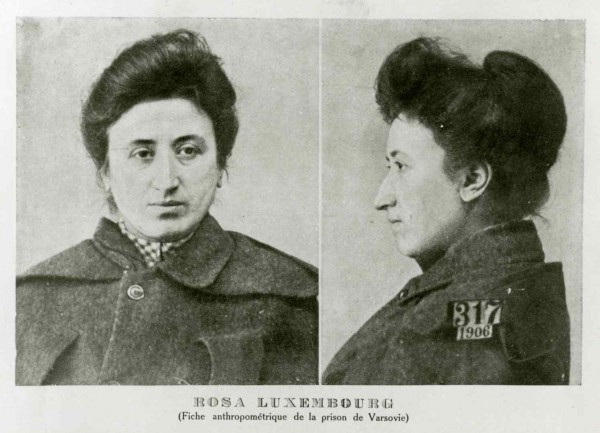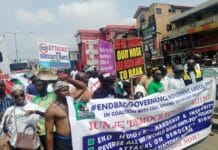Lessons for the workers’ movement internationally
The independence referendum in Scotland on September 18 became a mass electoral revolt against the austerity policies of British capitalism and the right-wing Cameron government. The Committee for a Workers’ International (CWI) and its Scottish section supported a Yes vote for independence from the United Kingdom, but argued this must also be linked to a struggle for socialism in Scotland and internationally.
Here are two articles by Philip Stott, one of the leaders of Socialist Party Scotland (CWI), and by Peter Taaffe, General Secretary of the Socialist Party (CWI) in England and Wales. These draw out important lessons for socialists in how to approach the national question.
It should be noted that the ruling classes of almost the whole world supported the British capitalists in opposing Scotland’s breakaway, as did some sections of the left. The leaders of the European Union feared that a Yes vote in Scotland would trigger a chain reaction of similar demands in countries like Belgium, Italy, and especially Spain, where national and linguistic divisions have widened as a result of the capitalist crisis. One German politician expressed his relief with the No victory in Scotland because, “It prevents further fragmentation of Europe.” US president Obama gave his support for the No side, as did former president Bill Clinton.
China’s Premier Li Keqiang also said he wanted to see a “united” United Kingdom, which is no surprise given the CCP’s deeply ingrained fears of ‘separatism’ in places like Tibet and Xinjiang. Some opposition groups in China and Hong Kong have drawn the conclusion that the mere fact the British state agreed to hold a referendum in Scotland is a testimony to its strongly ‘democratic’ nature, something that would be unthinkable in authoritarian states such as China. But this view is superficial and mistaken. Belgium and Spain, also capitalist ‘democracies’, have outlawed similar referendums on independence among their own minorities, and the leaders of these countries were embarrassed and angered that Britain’s prime minister David Cameron had blundered into calling the Scottish vote.
In fact, Cameron took this decision at a time when opinion polls showed only around one quarter of Scots favoured independence. He believed then in a crushing victory that would bury the spectre of independence forever. This completely misfired, with support for Yes surging once the campaign began and the Scottish masses realised they had a unique chance to hit back through the ballot box against decades of anti-working class policies and neo-liberalism. This was despite the pro-capitalist position and extremely limited programme of the main independence party, the Scottish National Party (SNP), which runs the devolved Scottish government in Edinburgh.
The British government and all major parties including the pro-capitalist opposition Labour Party, then unleashed what became known as “Project Fear” to terrorise the population of Scotland with the scenario of economic collapse and high unemployment if the Yes vote won. It is also worth noting the confusion among Hong Kong’s nativist groups on this issue. On the one hand the nativists flirt with the idea of Hong Kong independence, but on the other hand many also have illusions in the British capitalist state. This plunged them, not for the first time, into a confused state of silence over what was happening.
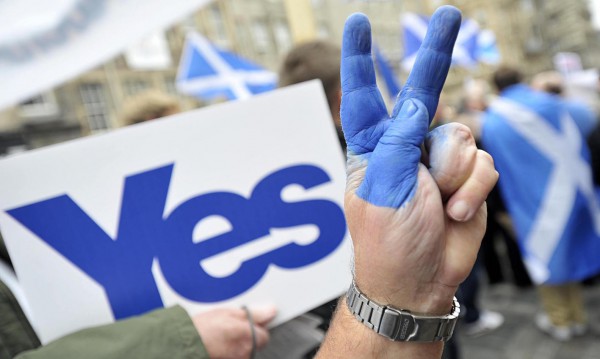
1.6 million vote Yes in a working class revolt against austerity
Urgent to build new mass party for the working class
Philip Stott, Socialist Party Scotland (CWI in Scotland)
In the teeth of a ferocious campaign from the British capitalist establishment, the independence campaign in Scotland won the support of more than 1.6 million people in Scotland, overwhelmingly from the working class, securing 45%. No won with 55%. According to the YouGov polling organisation support for independence stood at 24% in January 2014. This increased by 21% in nine months as hundreds of thousands of working class people poured into the Yes camp seeking fundamental change and an escape from austerity.
There was a very real threat of a Yes majority in the 10 days before the vote which rocked the capitalist establishment to its foundations. However, a combination of panicked late promises of more devolved powers for Scotland and the unleashing of “Project Fear on steroids” by big business, the capitalist media and the Tory, Labour and Lib Dem parties, to save their class interests, secured a No majority.
The fact that so many working class and young people people refused to be cowed and voted Yes reflected the desire among the “victims” of austerity to use the referendum as a weapon to hit back at the political establishment.
The charge of intimidation aimed at Yes supporters, and made by Labour and the bosses’ press, is farcical. Project Fear was real intimidation. As is the savage austerity that is destroying working class lives and communities day-in and day-out.
Moreover, the immediate legacy of this brutal intervention by the capitalist class is a radicalised and energised working class in Scotland who have been “educated” as to the lengths that the capitalist elite are prepared to go to defend their own interests.
The overwhelming mood of those who’ve voted Yes is naturally disappointment, but also that the fight against cuts and for a new political future for Scotland goes on. Indeed, that the momentum needs to be stepped up in the aftermath of the referendum.
Many of these angry and energised working class people can be won to socialism and to a new mass working class party in Scotland. This task of establishing a new political force for the working class is something that socialists and trade unionists need to urgently turn their attention to following the referendum.
Illustrating this mood, Socialist Party Scotland received this text from a 22 year-old from East Kilbride just after the result: “Disappointed with the result but it has helped me make up my mind, so I have sent you an application to join your party. I am 100% behind the Socialist Party”
Huge turnout
A colossal 3.6 million voted in the referendum, an 85% turnout which broke all records. The turnout in working class areas was unprecedented. In housing schemes across Scotland it reached 70% plus. This compares with average turnouts in council elections of 25-30%. Hundreds of thousands of working class people voted Yes, seeking an escape from brutal austerity and the capitalist political elite who are implementing these cuts.
Working class strongholds including Scotland’s largest city Glasgow, Dundee, North Lanarkshire and West Dunbartonshire voted Yes. Working class communities in cities and towns across Scotland also saw a majority voting Yes.
Some workers did vote No, many reluctantly, when faced by the tsunami of threats and blackmail by big business and the media that jobs would go, companies would relocate to England and that working people would be worse off under independence.
The media was overwhelmingly savagely hostile to independence. Only one newspaper in Scotland, the Sunday edition of the Herald, supported a Yes vote. The naked bias of the BBC caused outrage and exposed the corporation as an arm of big business interests. The failure of the SNP leaders to respond to these attacks, emphasising their desire to cut taxes for big business and seeking a currency union that would have caught an independent Scotland in an austerity trap, left the propaganda of Project Fear largely unanswered.
Another key factor in the result was a lack of confidence in the SNP leadership’s proposals for an independent Scotland, which were predicated on a continuation of capitalism and no clear end to cuts. The lack of trust and confidence in Alex Salmond and the SNP was continually expressed by many during the campaign. Most people, when polled, believed that Scotland and their own families would be worse off economically under the SNP’s version of independence.
Build a new party
Had a mass working class party existed it could have mobilised far greater support for a Yes vote based on a clear policy to end austerity, for public ownership, a living wage etc. That means a socialist Scotland that would deliver for the millions rather than the millionaires. The turnouts and mass enthusiasm for Tommy Sheridan and the Hope Over Fear tour, which Socialist Party Scotland played a leading role in, underlines that potential.
It’s urgent that moves to build a new mass party are taken now to provide a new political home for the working class. If there is a delay in this development there is a danger that the opportunity can be lost and the pro-capitalist SNP can gain instead. Even Labour, despite its betrayals, could pick up short-term electoral support in the Westminster elections next year, when the question of removing the Tories from government is posed.
The example of Spain and the rise of Podemos in the recent European elections, which came from nowhere to receive millions of votes, shows what is possible. The authority built up through the Hope Over Fear tour means Tommy Sheridan, alongside socialists, trade unionists in the RMT and others, could help launch a new party that could build rapidly
As Socialist Party Scotland predicted the referendum was used as a weapon by huge numbers of working class people to protest against the political elite and the austerity they are inflicting on communities across the country. There was therefore a marked class differentiation in the vote.
The more affluent middle class and rural areas of Scotland voted heavily for No. As did a big majority of the over 55’s. While the turnout was high across Scotland, it was at its highest in middle class and rural areas that were mobilised to try and ensure the defeat of a Yes majority. This included areas where the SNP have had their traditional base of support.
Empty victory
The outcome of the referendum is ultimately an empty victory for the capitalist class and the political elite. It has ushered in a new and unstable situation for British capitalism. The conceding of more widespread powers for Scotland is now unavoidable. Demands for more devolution for Wales and Northern Ireland will also increase, as will calls for forms of devolution in England.
Tory prime minster Cameron within hours of the result promised a new constitutional settlement with “English MPs deciding on English laws”
As the BBC’s Andrew Marr commented: “What started as a vote on whether Scotland would leave the UK has ended with an extraordinary constitutional revolution announced outside Downing Street by the Prime Minister.”
But the issue of Scottish independence has not been “settled for a generation” as claimed by Cameron. The demand for another referendum will grow. Especially following the Westminster elections in 2015. All the main parties, including Labour, will continue with austerity and Tory cuts.
Labour have lost the working class
Most importantly, this referendum has exposed the erosion of support for the main parties of big business, in particular the Scottish Labour Party. The Tories and the Lib Dems are almost an extinct species in Scotland. But Labour’s base of support among the working class will have been undermined even further by acting as the main prop for Project Fear and working hand-in-glove with the Tories. As one NHS worker put it to us; “Labour saved the Union, but it lost the working class.”
Incredibly, Labour’s leader in Scotland Johann Lamont described the vote as a “victory”. Labour’s former working class base has been decimated and they will not be forgiven for the role they have played.
The limitations of the pro-capitalist SNP leadership has also been exposed. The potential for a new mass working class party in Scotland has grown enormously during this campaign. Urgent and concrete steps need to be taken to capitalise on this in the weeks ahead.
There will be both disappointment and a real and lasting anger among thousands of working class people at the outcome of the result. Protests and demonstrations are likely to take place in the next few days.
The feeling that the media, big business and the political establishment need to be taken on will grow in the aftermath of the referendum. There is no possibility that the huge radicalisation of working class people that has taken place through the referendum will be dissipated as long as this mood and combativity is built on.
Socialist Party Scotland says
- Not a penny more in Westminster cuts to be implemented in Scotland by the SNP government or Labour and SNP councils. Set needs budgets that defend jobs and public services.
- Build a mass movement of strikes, demonstrations and mass protests against austerity. Trade unions must build mass coordinated strike action in Scotland and throughout Britain.
- For a new mass working class party to offer a fighting alternative to the 1.6 million who defied Project Fear
- Join Socialist Party Scotland and fight for socialism
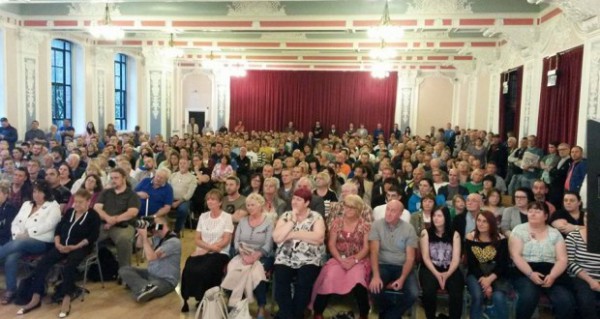
Scotland’s Independence referendum – A working-class revolt
The referendum has turned British politics upside down – even though the No vote won
Peter Taaffe, General Secretary, Socialist Party (CWI England & Wales)
The independence referendum in Scotland was remarkable for many things: the huge politicisation and class polarisation, combined with the beginning of mass intervention in politics, particularly by the most oppressed sections of the working class, shaping their own destiny. This was hitherto seen as the preserve of the self-appointed, stifling elites who dominate what passes for political discourse in Britain. The referendum, with its heightened passion, has altered the political landscape of Britain: ‘things will never be the same again’, as even capitalist commentators have observed. One of its most striking results was the effect that it had internationally. A country with a similar population to the historic county of Yorkshire, and half that of greater London, albeit with a proud history of working-class defiance, shook Europe and the world to their foundations.
World leaders, from Barack Obama to the Chinese head of state, Xi Jinping, drawing in the Pope on the same side as the Orange Order, were lined up to urge frantically the rejection of Scottish independence. The British ruling class which, within living memory, ruled one quarter of mankind – with its prestige and what remains of its world reputation at stake – was so terrified of a Yes vote that it outdid itself in venom against those advocating independence. “The world is saying no to Scottish separation”, shrieked Phillip Stephens in the Financial Times. A few days before the referendum took place, the same journal reflected the sheer terror of the capitalists: “Ruling elite aghast as union wobbles… Business onslaught over Yes vote… Business 90% against Yes”.
Surprise, surprise, the International Monetary Fund was also conscripted to the anti-independence bandwagon and warned “Recession risk in markets”. Alan Greenspan, former chairman of the US Federal Reserve and fresh from presiding over the greatest financial and economic disaster witnessed since the 1930s, returned from internal exile to warn that “a Yes vote would be an economic mistake for Scotland [and] a geopolitical disaster for the west”. And if Scotland had actually voted for independence, it would be punished: “The Scots will discover the taste of austerity”, warned the FT.
Why this hysteria, a seeming absence of any sense of proportion when judging the events in Scotland, on the part of these mandarins of capitalism? The explanation is to be found in the opposite yet equally powerful response that events in Scotland have enthusiastically evoked among the masses in Europe and elsewhere, with many countries facing their own explosive national question. Mariano Rajoy, Spanish prime minister, and his foreign minister, with the Catalan masses breathing down their necks, naturally viewed Scottish independence quite simply as a ‘catastrophe’ which would, they claimed, “worsen the economic slump in Europe and risk the EU’s disintegration”.
In reality, it is the ‘Balkanisation’ (their word) of Spain, the right of self-determination and independence for the Catalan people and, following them, the Basques, which they mortally fear. The Catalan movement was given a big boost by virtue of the fact that the Scottish referendum was taking place. ‘How could Cameron have so miscalculated?’ was the snarl, which echoed throughout Europe. It has encouraged the Catalans and other nationalities to demand their own referendum – bitterly resisted by Madrid. Meanwhile, in Italy, there exists a simmering mood in the Alto Adige, the largely German-speaking region, demanding similar rights as the Scots for a say in their future, while the right-wing Northern League is making similar demands for northern Italy.
Socialists and the national question
These examples of the international ramifications of Scotland’s intense debate over independence show that there is hardly a country today that does not have, to one degree or another, a national question which threatens to detonate at any time. The onset of a world economic crisis has resurrected the national question in regions and countries where it seemed previously to have been settled.
This means that the labour movement, particularly those who claim to be socialists and Marxists, have to grapple with this issue. In so doing, it is necessary to avoid falling into the pit of opportunism, of accommodating to bourgeois, capitalist nationalism or of adopting an empty, abstract, propagandist approach which can never succeed in connecting with the real movement of the working class, particularly its oppressed layers.
At each stage of developments over the last four decades the forces of Marxism in the ranks of Militant, now the Socialist Party, supported the Scottish people’s legitimate demands in the national sphere. While the summits of the labour movement, not just the right-wing but also those then on the ‘left’ like Neil Kinnock, opposed even limited devolution for Scotland in the 1970s, we unequivocally supported it. We did not engender any illusions though that this was a ‘final destination’ that could solve all the problems of the Scottish people.
At the same time as defending the right of self-determination for the Scottish people, we did not favour the Balkanisation of countries composed of different national groups. It is absurd to imagine that any country, particularly a small country, can prosper and solve their problems in isolation. In a globalised world, it is not possible to go it alone. The striving for ‘unity’ of the European capitalists, enshrined in the EU, is an expression of the need for the productive forces – science, technique and the organisation of labour – to be organised on a continental and even a world scale. But the capitalists can never fully overcome the limits of private ownership or the nation state. Only the working class acting together can, through a democratic socialist united states of Europe, achieve this task.
Therefore, while fighting for an independent socialist Scotland we, and particularly our comrades in Scotland, link this to a socialist confederation in the first instance of Scotland, England, Wales and Ireland, as well as a socialist Europe. There were occasions in the past when we argued against independence for Scotland as an immediate demand, particularly as a slogan. This was because independence did not enjoy the support of significant sections of the population. In these circumstances, to advocate ‘self-determination’, and particularly independence, that is separation, could be interpreted by many Scottish workers as expressing a wish that we, the majority, do not want to live with them in a common state. However, once the idea of independence had gripped the minds of the masses, the support of a majority or a significant and growing minority, we faced a changed situation.
The direction of travel has been clear in Scotland for a long time. The election of the Scottish National Party (SNP) as a majority in the Scottish parliament was seen as a staging post on the way to ‘independence’, particularly for the most energetic and dynamic sections of the working class who have come to the fore in the referendum campaign. A significant section – oscillating between 40-50% – of young people in particular had already embraced this idea, long before the referendum was agreed. The task of Marxists was to give support generally but seek to give it a socialist content. This was and is combined with warnings about the inadequacies, to say the least, of the SNP’s resolve to remain within the framework of capitalism, which would mean that few of the social demands driving the Yes campaign could be realised. On the contrary, savage austerity would have been the future for Scotland unless workers were able to use victory in the referendum to press for a break with capitalism.
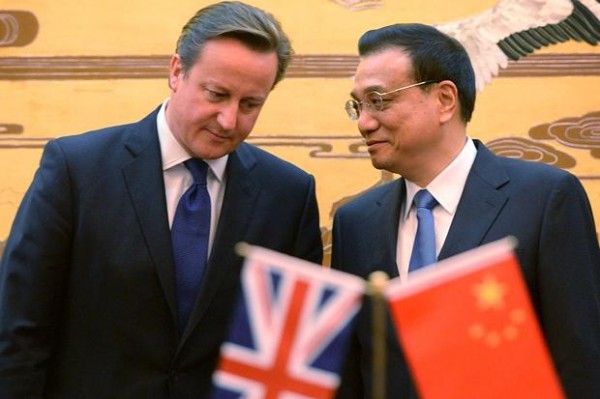
Mistakes of the left
The Yes campaign provided a huge opportunity to strike a blow against the plans of British capitalism for systematic attacks on the working class. Hence the Yes placards that declared “an end to Tory rule for ever”. Unfortunately, that would not have followed independence, automatically, in the sense of an end to cuts and support for pro-big business policies, with an SNP government speaking out against austerity but implementing it in practice while continuing to rule Scotland. But it showed the class feelings behind the demand for independence.
It is incredible therefore that even sections of the left, like George Galloway, bitterly opposed independence on a shared platform with Tories, Liberal Democrats, as well as an increasingly discredited Ed Miliband in the No camp. Despite his heroic stand in the past against the Iraq war, as well as his championing of the general case for socialism, Galloway was roundly booed by significant sections of the young people gathered at the debate for 16-year-olds. But he was not alone, especially when he falsely claimed that “austerity is ending” and “a 1945-style Labour government” was in prospect for 2015.
The Communist Party of Britain (CPB), linked to the Morning Star newspaper, also found itself on the wrong side of history. “A No vote in the referendum has to be made the springboard for the mobilising of the working-class movement at British level to demand real constitutional change”, was its position. (Statement on Scottish independence, 4 March 2014) Just how this is possible when you oppose the aspirations of the mass of the Scottish working class remains a mystery. The CPB’s reasons for opposing the Yes vote? “Membership of the sterling area which subordinates Scotland to the current neoliberal policies without any power to change them, at the same time seriously erodes the opportunity for united working class action across the nations of Britain… Worse still, membership of the EU would oblige Scotland to incorporate in any written constitution the terms of the 2012 Treaty of Stability, Coordination and Governance”.
But why does this follow from independence? Surely the working class in an independent Scotland would have the opportunity, perhaps a greater opportunity, to oppose membership of the EU? The CPB demonstrates here a fetish about the sterling area, as well as in relation to the EU. Membership of both has not stopped a united working class in Britain or Europe from fighting the bosses and opposing actual or proposed anti-worker legislation.
The implied argument here is that support for the independence of Scotland automatically divides the working class. Yet it is possible to support independence and fight for and unite the working class. This was answered more than a century ago by Karl Marx and Vladimir Lenin. Indeed, the Marxist movement, from the time of Marx, has a long pedigree on this issue. Marx, in general, stood for a unified state. Yet both he and Engels stubbornly advocated Irish independence. Only after independence, argued Marx, would federation between Ireland and Britain then be posed.
Lenin deepened this approach in educating the workers of Russia to defend the right of self-determination of nations oppressed by tsarism. Lenin argued that only in this way would it be possible to gain the confidence of the masses of the oppressed nations. On the basis of a democratic socialist republic they would not cut away but voluntarily link their fate to that of the masses of Russia. This presentation of the issue was brilliantly confirmed in the course of the Russian revolution. The Bolsheviks recognised the right of self-determination including secession, as was shown by the example of Finland, which separated in 1918.
The arguments of the CPB and the small organisations on the left, including some alleged ‘Marxists’, are echoes of the approach of Rosa Luxemburg. She opposed Lenin’s proposal for the right of self-determination and also the decision of the Bolsheviks after taking power in 1917 to give the land to the peasants. She saw these demands as representing a backward step. On the contrary, the Bolsheviks managed to unite the working class, because they also opposed bourgeois nationalism – as the Committee for a Workers’ International (CWI) has done consistently in Scotland.
Lenin explained that, sometimes, you can take one step backwards in order to take two steps forward. Where the land is divided, it is done in order to win the confidence of the peasants who could only be convinced of the necessity of large-scale production in agriculture over a period of time and with their consent. The same applies to self-determination which allows oppressed nationalities to pass through the stage of realising their own demands, allowing them in practice to see the need to unify the productive forces on a bigger scale, thereby arriving at a voluntary confederation.
Only the CWI has had a consistent position on the national question, both in Britain and internationally. The Socialist Workers’ Party (SWP), for example, in the 1970s debate over devolution, declared: “If a referendum is eventually held in Scotland and Wales we abstain. This is not a position that means ducking the arguments… Our abstention will mark us out from the rest of the labour movement, retreating in fear before the new reformism, without aligning us with the unionist, British, nationalist camp”. (The National Question, September 1977) Like a leaky umbrella that does not work when it is unfolded, this policy was unceremoniously abandoned without explanation.
Problems of referendums
It is true that the form in which the struggle over independence was conducted was not ideal. Referendums are not the preferred weapon of the working class and its organisations. Dictatorships or undemocratic regimes often use referendums to bolster their position, presenting a simple choice: yes or no. The labour movement and particularly socialist forces are sometimes compelled to stand alongside of, and share platforms with, bourgeois or pro-bourgeois forces, with the political risk that they will not be able to get over their message and programme.
Referendums can also be a trap for genuine socialist forces if they do not clearly differentiate themselves politically, in terms of perspective and programme, in the course of the campaign from temporary nationalist ‘allies’. This does not necessarily involve directly attacking forces with which we are aligned. Sometimes, it is sufficient to just outline our case, which will bring out clearly to workers our differences with the nationalists. If we are skilful enough, audiences, particularly workers, will draw the right political conclusions. However, on other occasions it may be necessary to sharply differentiate ourselves in terms of programme and perspectives from, for instance, bourgeois or petit-bourgeois nationalists – the SNP in this referendum – and also from left nationalism.
The forces of the CWI that participated in the Scottish referendum did not fall into the trap of bolstering the SNP. While energetically supporting the Yes campaign in general, the Socialist Party Scotland (SPS) collaborated in a splendid independent, working-class orientated and effective campaign, which drew in hundreds and thousands of enthusiastic Scottish workers alongside Tommy Sheridan and prominent SPS members. Even Rupert Murdoch, in a backhanded compliment, recognised this when he complained that too many “lefties” were prominent in the Yes campaign.
Moreover, our case was spelt out in some programmatic detail and contrasted with the false perspectives of those nationalists who painted a rosy future for Scotland on a capitalist basis. All the previous capitalist models that the SNP invoked in the past – Ireland, Iceland, and Scandinavia as a whole – are now clearly tarnished as a result of the devastating world economic crisis. The referendum showed a massive rejection of austerity, whether imposed from Westminster or Edinburgh. The demographic breakdown of voting patterns showed that it was the working class, particularly its most deprived and oppressed sections in the areas that voted Yes, in Glasgow, Dundee, West Dunbartonshire and North Lanarkshire, alongside the majority of the 16-17 year-olds, who massively opted for independence.
Tory manoeuvring
If ever there was an example of the kind of ‘nationalism’, reflecting the “outer shell of an immature Bolshevism”, about which Leon Trotsky spoke, it was in the solid working-class vote for Yes in this referendum. ‘Independence’ was organically linked in the minds of the masses with complete independence from those who imposed the poll tax in the past, the bedroom tax today, the persecution of the disabled and sick, etc.
This mood has not gone away. David Cameron, two weeks before the vote, believed he was facing defeat, which would in all probability seal his political fate. Even the Tories were baying for his blood. If Scotland had voted Yes, Cameron’s own party would have voted No to him! In the event, a massive scare campaign, crucially and massively helped by the intervention of the Labour leadership, particularly Gordon Brown – using up whatever political capital he still possessed – managed to corral the overwhelming majority of the middle-class and the ‘don’t knows’, into the No camp.
The ferocious No campaign in the last stages had an effect. Matthew d’Ancona wrote in the Sunday Telegraph: “Lord Ashcroft’s post-referendum polling shows that 19% of those who voted No made their decision to do so in the past month – a vindication of the frantic campaigning by the Unionist side in that period”.
However, this has created almost as many problems for the British ruling class as a Yes vote would have done. Cameron, the gambler that he is – ‘chancer’, according to the Sunday Telegraph – within hours of the result being announced, stated that he would ‘honour’ his promise to deliver more powers on tax and welfare to the Scottish parliament. But he added the twist that “new powers for the Scots should be balanced by new rights for the English”.
There was an implied threat that, if this was not agreed, then the ‘vow’ of devo-max for Scotland would be withdrawn. However, this would be “incendiary” in Scotland, as the retiring SNP leader, Alex Salmond, said. Cameron has no choice but to give concessions or he will face a bigger uprising than witnessed in the referendum. His proposal is clearly designed, with a general election months away, to appeal to English nationalism, with the added advantage, he believes, of outfoxing Ukip and, at the same time, wrong-footing Miliband and the Labour Party.
He is unlikely to get his proposals passed this side of a general election. However, it is striking how all the Tory voices which appeared on television – Cameron, Heseltine, Hague, etc – under the cloak of ‘greater democracy’, advocate that the 59 Scottish MPs (41 of whom are presently Labour) should no longer vote on ‘English matters’ in the House of Commons.
Their reasoning goes that, even if Miliband wins in May next year, he will not be able to implement his programme because Scottish MPs will be debarred from voting on crucial issues – the so-called ‘West Lothian question’. Yet Will Hutton in the Observer pointed out: “The McKay commission, on the impact of devolution on British government, pointed out there have only been two electoral periods since 1919 – 1964 to 1966 and between March and October 1974 – when the party in government had not won a majority in England. Moreover, [the online democracy project] mySociety finds that of 5,000 votes in the House of Commons since 1997, only 21 depended on the votes of Scottish MPs”.
These proposals have been signed up to by not just Tory luminaries but also Nick Clegg. They include ‘greater powers’ to cities and regions. This is clearly designed to give more power to the undemocratic, dictatorial mayors like Boris Johnson in London to implement brutal anti-working class measures, such as the assault on ticket offices at the present time on London Underground.
No oversight is really exercised by councillors below the mayors or council cabinets and, indeed, the very creation of these positions is designed to allow these hatchet men to more easily implement further cuts. They are part of the overall programme to further attack the living standards of the working class. They must be implacably opposed and met by counter-proposals by the labour movement. This should include the abolition of mayors and cabinet rule in local authorities. Full democracy and accountability of local councillors should be restored.
Seizing the moment
Cameron was given a bloody nose in the referendum campaign. It is now time to finish off the whole of the Tory gang and all capitalist politicians threatening to drag working people further into the abyss. Scotland has shown that the working class is rotten ripe for a clear political alternative. The events around the referendum, particularly among the working class, show that a potential ‘Podemos moment’ exists. In Spain, the radical movement around Podemos came from nowhere to capture in six weeks 1.2 million votes in the European elections. Something similar is now possible in Scotland if Tommy Sheridan, aligned with the Marxists and others, particularly the trade unions like RMT, were to take the plunge and create a socialist, radical alternative which would act as a magnet to all of those workers and youth inspired by the independence campaign.
Unfortunately, however, instead of striking out boldly to lay the basis for a new party of the working class, Tommy has now stated: “I suggest we in the Yes movement promote continued unity by backing the most likely independence supporting candidate at next May’s general election. In concrete terms that means advocating an SNP vote to try and unseat as many pro-No party supporters as possible”.
This statement was made without, as far as we are aware, any serious consultation with those who supported and worked alongside him very successfully in the Hope not Fear campaign. It was the socialist message combined with firm support for independence that attracted thousands who were and remain deeply opposed to and suspicious of the SNP. Now Tommy suggests the lessons of that campaign should be abandoned. The working class should line up behind the SNP despite the fact that it has already carried out cuts and will carry through more, including before the 2015 election.
Thousands of socialists, therefore, will be behind a pro-cuts agenda if Tommy’s suggestions are accepted, with socialist policies postponed to an indefinite future in the ‘national cause’. What is this except a disastrous repeat of 1918 in Ireland when the Irish nationalists also argued ‘labour must wait’, and the craven trade union leaders like Thomas Johnson acceded to this? Irish labour left the field free to the nationalists and Sinn Fein with disastrous results for the working class.
Tommy also states: “We should insist all pro-independence candidates in the 2016 Scottish election commit to a March 2020 referendum”. How timid! Why wait four years to implement a referendum? Indeed, with a massive new mandate, why would a Scottish government necessarily go for a referendum as the route to independence? But if it did, it would be able to go for it immediately and score a stunning victory.
But his proposals should be rejected for other reasons as well. He states: “Unity is strength. Don’t let our differences weaken our cause”. But this does not apply between parties based on the working class and those pro-capitalist parties like the SNP who inevitably betray the aspirations of those who are seduced into supporting them. If implemented this would cripple the independence of the Scottish working class and its ability to resist the onslaught of the capitalists politically.
The campaign has shown what an independent socialist campaign could achieve. It is necessary to build on this. This is the real lesson of the Scottish referendum. The idea that independence for Scotland is off the agenda “for a generation”, as Salmond said, is totally false. The genie is out of the bottle and the demand for an independent, socialist Scotland will grow in intensity as the crisis of capitalism worsens and provokes a mass revolt.
